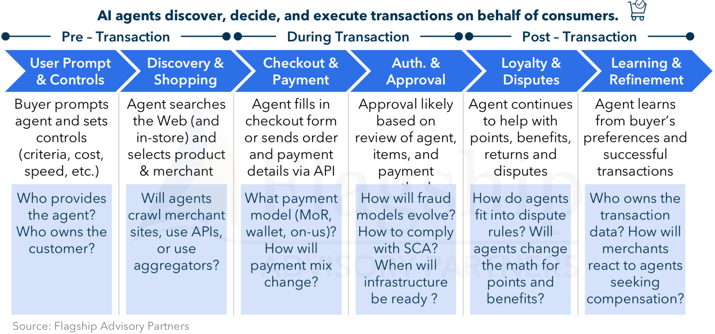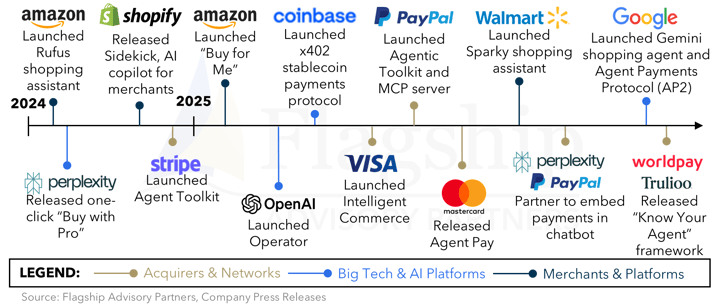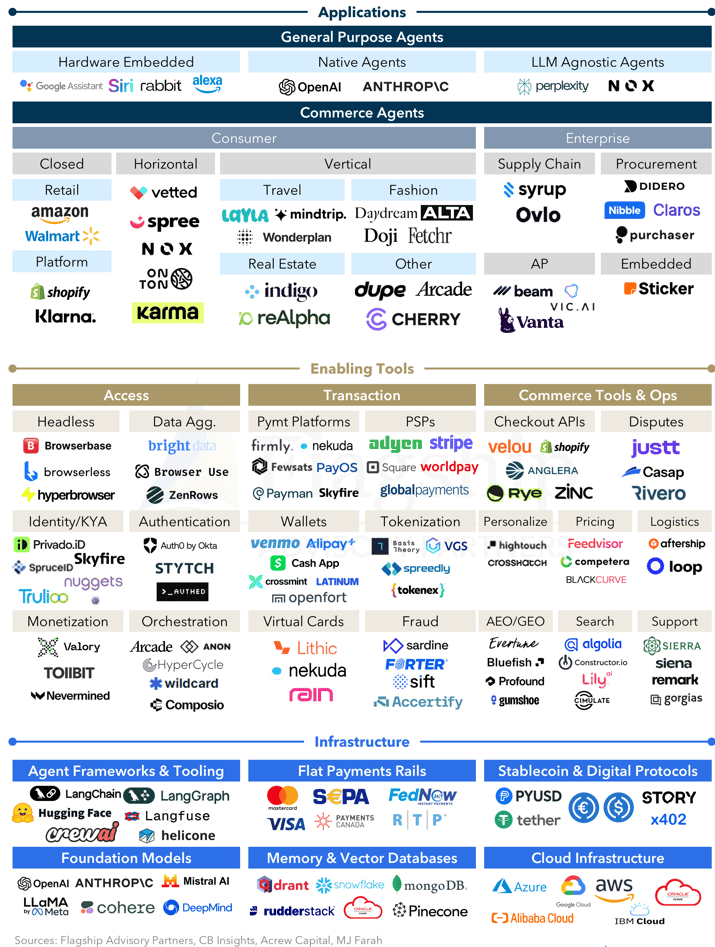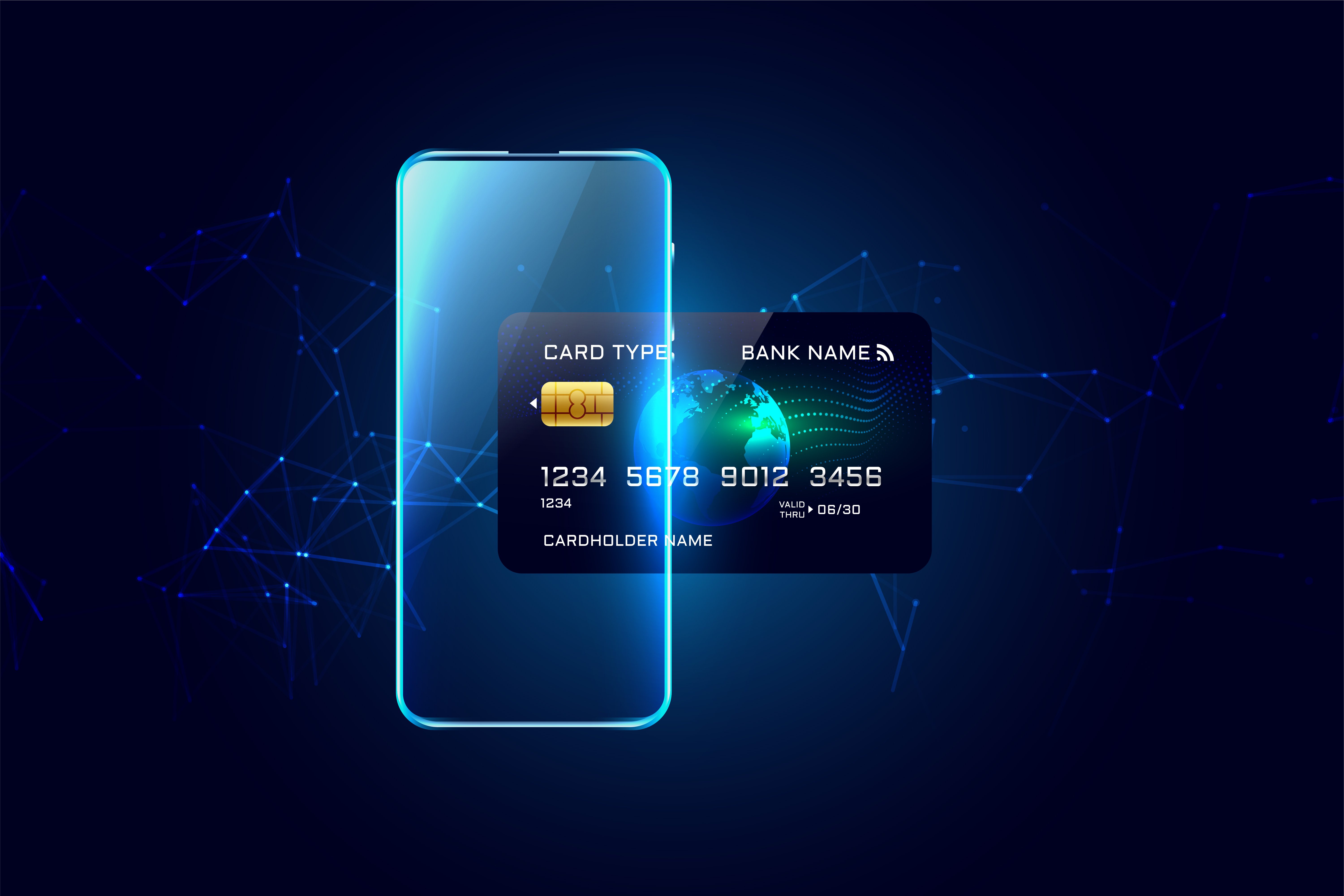Designed by Freepik
Innovations
Innovations
Image Credit: Designed by Freepik
Ben Brown, Tim Gallagher, Joseph Kraut • 25 September, 2025
Agentic commerce has shown a rapid uptick in interest recently. In this infographic, we pose a few strategic questions for the payments industry and map the broad ecosystem emerging to enable agentic commerce.
General Commentary and Highlights
- ARK Invest forecasted that AI agents could facilitate nearly $9 trillion in payments by the end of the decade (25% of ecommerce), growing from basically zero today.
- However, for agentic commerce to achieve that level of success, it must be trusted by customers and supported by merchants, which will require robust and accessible technology, fair and sustainable economics, and updates to the fundamental rules that govern digital payments today.
- If agentic commerce scales, it will fundamentally alter behavior across the customer journey: how people search for products, make purchasing decisions, pay for goods, and interact with loyalty programs. It is far more than an evolution of the checkout experience.
- It's still a fair question to ask, at this early stage, will agentic commerce turn out like Mobile (transformative) or the Metaverse (mostly hype)?
1. Agentic Commerce at a Glance
(illustrative; simplified e-commerce journey)

2. Recent Developments
(non-exhaustive; select key events)

3. Agentic Commerce Market Cap
(non-exhaustive; logos are indicative)

4. Proposed Agentic Payment Frameworks
(select details; non-exhaustive list of frameworks) (Sources: Flagship Advisory Partners, Company Websites, Press Releases & Product Demos)
A. Visa Intelligent Commerce1
- Two net-new capabilities (payment instructions and signals) supported by three pre-existing capabilities (authentication, tokenization, and personalization (data tokens))
- Authenticated users can create agent-specific tokens, which are locked until users describe payment instructions
- At point of purchase, agent shares purchase characteristics with Visa, which validates those signals against the instructions and unlocks the token
- With user opt-in, buyer insights can be shared with agents’ context window for personalization
B. Mastercard Agent Pay
- Adapts traditional tokenization into Agentic Tokens, explicitly for registering and governing AI agent activity
- Specifies data exchange standards for personalizing agentic shopping results
- Verifies user intent and matches it to transaction results
- Users can opt-in to personalization via biometric authentication
- By Q4 2025, all U.S. Mastercard cardholders will be enabled for the Mastercard Agent Pay program, with global rollout to follow
C. Google Agent Payments Protocol
- Open protocol for agent-led payments
- Payment-agnostic; works for cards, bank transfers, and stablecoins
- Can be used as an extension of the Agent2Agent (A2A) protocol and Model Context Protocol (MCP)
- Addresses simple use cases and enables new, complex commercial exchanges through digital contracts (“mandates”) that memorialize user instructions and limits, basket contents and prices
- Mandates address “human present” and “human not present” scenarios
D. PayPal Agent Toolkit & MCP Server
- API library for commerce capabilities (payments, orders, invoices, subscriptions, disputes, reporting, etc.)
- MCP server helps agents call PayPal’s APIs via structured interfaces, supporting faster deployment of agentic
- Integrates with agent frameworks such as OpenAI’s Agents SDK, LangChain, Vercel AI SDK
- Showcased demo with Gemini Shopping Assistant using agent-to-agent protocol
Please do not hesitate to contact Ben Brown at Ben@FlagshipAP.com with comments and questions.
1 Currently in development; availability may vary by market

Image Credit: Designed by Freepik
Agentic commerce has shown a rapid uptick in interest recently. In this infographic, we pose a few strategic questions for the payments industry and map the broad ecosystem emerging to enable agentic commerce.
General Commentary and Highlights
- ARK Invest forecasted that AI agents could facilitate nearly $9 trillion in payments by the end of the decade (25% of ecommerce), growing from basically zero today.
- However, for agentic commerce to achieve that level of success, it must be trusted by customers and supported by merchants, which will require robust and accessible technology, fair and sustainable economics, and updates to the fundamental rules that govern digital payments today.
- If agentic commerce scales, it will fundamentally alter behavior across the customer journey: how people search for products, make purchasing decisions, pay for goods, and interact with loyalty programs. It is far more than an evolution of the checkout experience.
- It's still a fair question to ask, at this early stage, will agentic commerce turn out like Mobile (transformative) or the Metaverse (mostly hype)?
1. Agentic Commerce at a Glance
(illustrative; simplified e-commerce journey)

2. Recent Developments
(non-exhaustive; select key events)

3. Agentic Commerce Market Cap
(non-exhaustive; logos are indicative)

4. Proposed Agentic Payment Frameworks
(select details; non-exhaustive list of frameworks) (Sources: Flagship Advisory Partners, Company Websites, Press Releases & Product Demos)
A. Visa Intelligent Commerce1
- Two net-new capabilities (payment instructions and signals) supported by three pre-existing capabilities (authentication, tokenization, and personalization (data tokens))
- Authenticated users can create agent-specific tokens, which are locked until users describe payment instructions
- At point of purchase, agent shares purchase characteristics with Visa, which validates those signals against the instructions and unlocks the token
- With user opt-in, buyer insights can be shared with agents’ context window for personalization
B. Mastercard Agent Pay
- Adapts traditional tokenization into Agentic Tokens, explicitly for registering and governing AI agent activity
- Specifies data exchange standards for personalizing agentic shopping results
- Verifies user intent and matches it to transaction results
- Users can opt-in to personalization via biometric authentication
- By Q4 2025, all U.S. Mastercard cardholders will be enabled for the Mastercard Agent Pay program, with global rollout to follow
C. Google Agent Payments Protocol
- Open protocol for agent-led payments
- Payment-agnostic; works for cards, bank transfers, and stablecoins
- Can be used as an extension of the Agent2Agent (A2A) protocol and Model Context Protocol (MCP)
- Addresses simple use cases and enables new, complex commercial exchanges through digital contracts (“mandates”) that memorialize user instructions and limits, basket contents and prices
- Mandates address “human present” and “human not present” scenarios
D. PayPal Agent Toolkit & MCP Server
- API library for commerce capabilities (payments, orders, invoices, subscriptions, disputes, reporting, etc.)
- MCP server helps agents call PayPal’s APIs via structured interfaces, supporting faster deployment of agentic
- Integrates with agent frameworks such as OpenAI’s Agents SDK, LangChain, Vercel AI SDK
- Showcased demo with Gemini Shopping Assistant using agent-to-agent protocol
Please do not hesitate to contact Ben Brown at Ben@FlagshipAP.com with comments and questions.
1 Currently in development; availability may vary by market







